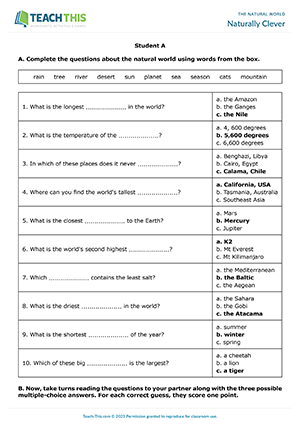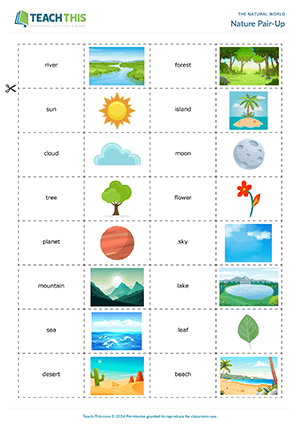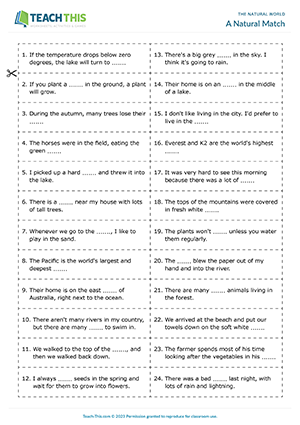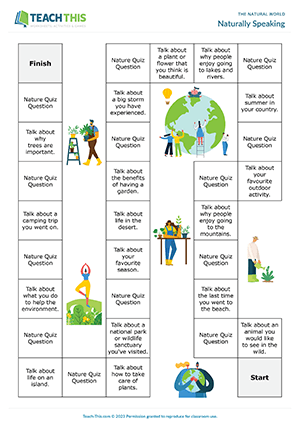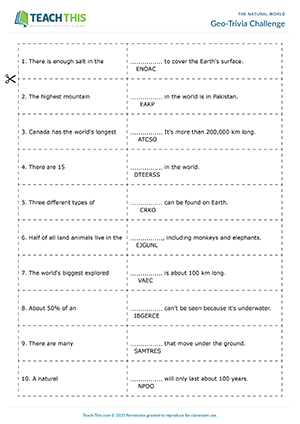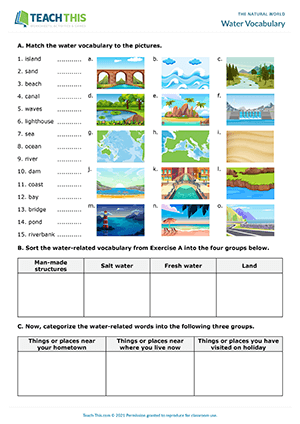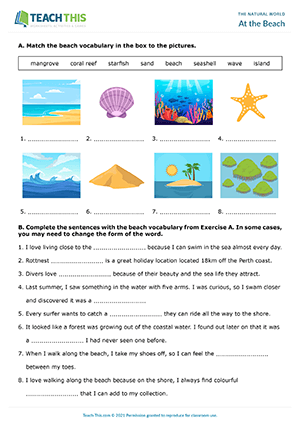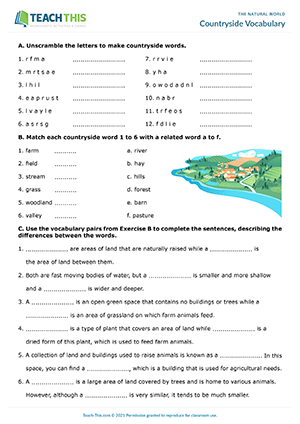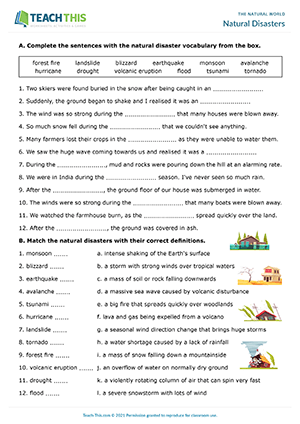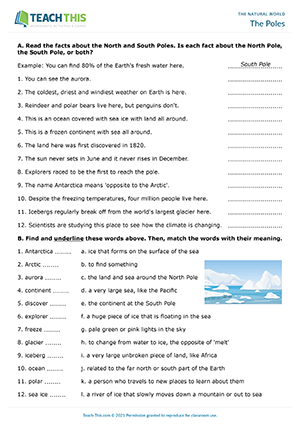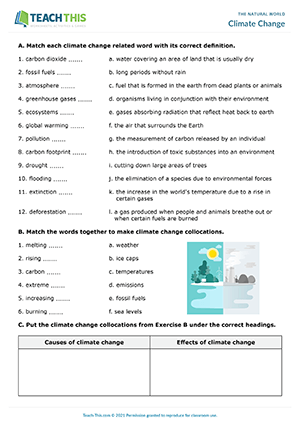This interesting natural world trivia quiz helps students practice vocabulary related to nature. First, in two groups, students complete natural-world trivia questions using words from a box. Next, students pair up with someone from the other group and take turns reading their questions to their partner, along with three possible multiple-choice answers. Students score one point for each correct guess. The student with the most correct guesses at the end of the quiz wins.
Here are two enjoyable natural world vocabulary games to help students practice words related to nature. Students begin by playing a game of snap. In pairs, students turn over a card from their pile at the same time. If the nature word card and picture card match, the first student to say 'Snap' scores a point. Students then pick up their own cards, shuffle them, and play again. If a student says 'Snap' when the cards don't match, the other student scores a point, and the game continues. The first student to get ten points wins the game. After that, students move on to play a pelmanism game. Students take turns turning over one nature word card and one picture card. If the word matches with the picture, the student scores one point and keeps the two cards. For an extra point, the student then tries to make a sentence with the nature word. If the student successfully makes a sentence, they have another turn. If the cards don't match, the student turns them back over. The student with the most points at the end of the game wins.
These two fun natural world games help students practice vocabulary related to the natural world. First, students play a gap-fill pelmanism game to practice the natural world vocabulary. In groups of four, students take turns turning over one gap-fill sentence card and one word card. If the word completes the gap-fill sentence, the student reads the sentence aloud, keeps the two cards, and plays again. If the word and sentence don't match, the student turns the two cards back over, and it's the next student's turn to play. The student with the most pairs of cards at the end wins. After that, students play a describing game using the words. In teams of two, students take turns picking up a word card and describing the natural world-related word on the card for their teammate to guess, e.g. 'It is something you find on the beach. It is usually white or grey.' Their partner then has ten seconds to guess the word. If they are successful, the team wins and keeps the card. If not, the card is removed from the game. It's then the other team's turn to play. The team with the most cards at the end of the game wins.
In this engaging natural world board game, students practice nature vocabulary and talk about nature-related topics. In groups, players take turns rolling the dice and moving their counter along the board. If a player lands on a 'Talk about' square, they talk about the nature-related topic on the square for 20 seconds. If a player can't think of anything to say or stops talking before the 20 seconds are up, they go back two squares. If a player lands on a 'Nature Quiz Question' square, another student picks up a card and reads out the quiz question along with three possible multiple-choice answers. If the player chooses the correct answer, they stay on the square. If not, they move their counter back two squares. The first player to reach the finish wins the game.
Here are two useful geographical feature games to help students practice or review vocabulary related to geographical features. First, students play an unscrambling and matching game in pairs. Pairs begin by unscrambling the geographical feature words on sentence ending cards. Next, pairs line up sentence beginning cards in order and match each one with an ending card. The first pair to complete all the sentences correctly wins. After that, pairs play a true or false game with the sentences. Each pair discusses which sentences they think are true and which they think are false, putting a tick at the end of the sentences that they think are true. Afterwards, check the correct answers with the class. The pair with the most correct answers wins the game.
This free water vocabulary worksheet helps students learn and practice water-related words that appear in nature as well as some water words that are associated with man-made structures. First, students match water-related words to pictures and sort the vocabulary into four groups, man-made structures, salt water, fresh water and land. After that, students categorize the water vocabulary into three groups, things or places near your hometown, things or places near where you live now, and things or places you have visited on holiday. Students then move on to use clues to complete a crossword with the water vocabulary. Finally, students complete Have you been to questions with names of places that correspond to the water vocabulary, e.g. names of islands, rivers, bridges, etc. Students then ask the questions to a partner and record their answers.
In this productive beach vocabulary worksheet, students learn nature words related to beaches. To begin, students match beach vocabulary to pictures and complete sentences using the vocabulary. After that, students answer questions related to beaches using specific words. Students then move on to indicate whether statements related to the beach vocabulary are true or false. In the last exercise, students draw a picture of a beach, containing as many beach words from the worksheet as possible. Students then take part in a picture dictation where they describe their picture to a partner for them to draw.
In this detailed countryside vocabulary worksheet, students learn words related to the countryside and review the differences between similar words. First, students unscramble letters to make words related to the countryside and match each countryside word with a related word. After that, students use the vocabulary pairs to complete sentences, describing the differences between the words. Students then read clues related to the countryside vocabulary and write the words being described. Following that, students name two examples for each item, e.g. name two famous rivers. Students then answer countryside conversation questions and write their answers in a chart. Students then ask the questions to a partner, writing down their answers and discussing each question. Finally, students share what they found out about their partner with the class.
In this insightful natural disasters worksheet, students learn and practice the names of natural disasters and related vocabulary. Students begin by completing sentences with natural disaster vocabulary from a box. Students then match the natural disasters to their definitions. Next, students guess what natural disaster each piece of advice is referring to. In the last exercise, students read, discuss and complete facts about natural disasters by circling the correct answers.
In this comprehensive North and South Poles worksheet, students learn and practice vocabulary related to the Poles. First, students read facts about the North and South Poles and write whether each fact is about the North Pole, the South Pole or both. After that, students find and underline polar-related words in the facts and match them with their meaning. Next, students complete a word family table with the North and South Pole vocabulary. In the last exercise, students read a passage about a scientist working in Antarctica. Students then find and underline the polar vocabulary in the passage and answer comprehension questions about the text.
In this compelling climate change worksheet, students learn essential terms and collocations associated with the topic of climate change. To start, students match each climate change word with its correct definition. Next, students match words together to make climate change collocations. After that, students put the climate change collocations under the correct headings, causes of climate change or effects of climate change. Students then move on to complete a text with climate change vocabulary from a box. Finally, students talk with a partner and make a list of four things they can do to reduce the size of their carbon footprint.
Latest Free
Resources
- Everyday Objects Bingo
Everyday Objects
Elementary (A1-A2)
- Action Verb Races
Actions
Elementary (A1-A2)
- Birthday Basics
Birthdays
Elementary (A1-A2)
- Sales Phrasal Verbs
Business Phrasal Verbs
Upper-intermediate (B2)
Latest Member
Resources
- Collocations at Work
Business Collocations
Intermediate (B1)
- Etiquette Trivia Board Game
Etiquette and Manners
Upper-intermediate (B2)
- Everyday Objects Vocabulary
Everyday Objects
Pre-intermediate (A2)
- Let's have a talk
Verb-Noun Collocations
Pre-intermediate (A2)



